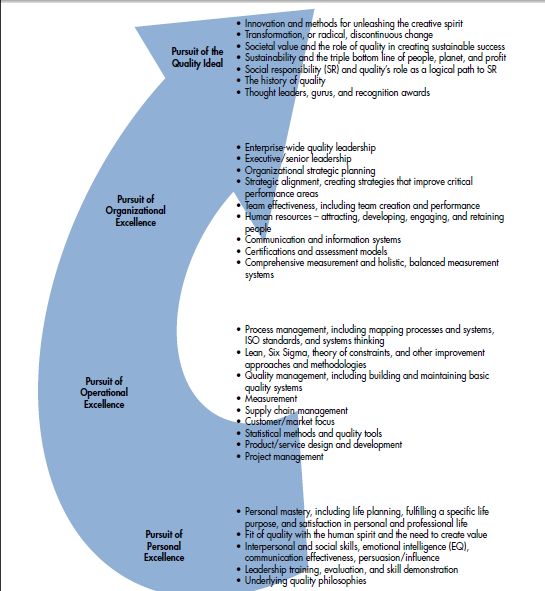ASQ's Quality Body of Knowledge Embraces Personal Excellence
- ASQ announces a Quality Body of Knowledge (QBOK®)
- QBOK Embraces Personal Excellence
- QBOK declares Pursuit of Personal Excellence as, Personal Mastery, Quality Fit, Interpersonal Skills, Leadership, and Personal Quality Philosophy
- How will it be integrated into certifications?
ASQ Quality Body of Knowledge Incorporates Personal Excellence
In 2008, ASQ's State of the Society announced the Quality Body of Knowledge (QBOK®) strategic management framework. In April of 2009, a QBOK advisory group completed version 1.0 of the framework for release throughout and beyond ASQ’s membership.
[Click on the Image for a larger version]
In 2007, after almost twenty years as a student of quality, it became clear to me that we (the quality profession) focused solely on the notions of business and team excellence. That is, what methods and tools could we use to drive organizational excellence and help teams achieve higher degrees of improvement.
At a presentation on Agile Software Development, it became crystal clear to me that teams are worthless without great people. It sounds so obvious when you say it out load, but think about it. What tools are in the Six Sigma or Lean toolboxes that focus on enabling individual excellence? It was then that Ceptara began assembling knowledge, training and tools focused on enabling individuals to become higher value contibutors. Not only to their organization, but also to themselves, helping them to find their true passions and align their daily work to that which drives them.
When I read an ASQ newsletter this month I was extremely pleased to see ASQ recognize and validate that individual excellence or what we call Personal Excellence is a valuable part of driving excellence.
Let's look at what ASQ declares as "Pursuit of Personal Excellence"
- Personal mastery, including life planning, fulfilling a specific life purpose and satisfaction in personal and professional life
- Fit of quality with the human spirit and the need to create value
- Interpersonal and social skills, emotional intelligence (EQ), communication effectiveness, persuasion / influence
- Leadership training, evaluation and skill demonstration
- Underlying quality philosophies
[1] Personal Mastery - this reminds of the first three habits in Covey's Seven Habits. That is, a deep investigation of our character and our desires (Personal Mission Statement), what are we striving for (Begin with the End in Mind), and how are we achieving satisfaction in the pursuit on a daily basis (First Things First). I'd like to see more around achieving specific goals and how it relates to everyday life, such as embracing Getting Things Done as a methodology.
[2] Fit of Quality - to me this is talking about our innate desire to do things well. Generally, I believe that everyone wants to do a good job and is only limited by their own capabilities and the tools that they've mastered. Or as Covey might refer to this area, to live, to love, to learn and to leave a legacy.
[3] Interpersonal Skills - the body of knowledge associated with this area is vast. Reams of paper have been dedicated to this topic including studies / evaluations such as Myers-Briggs conflict management, and the self-help genre, however, I have rarely seen it called out in context of technical skills building. Personally, I'd like to see this make a larger appearance in any training focused on driving operational excellence.
[4] Leadership training - Leading others requires mastering yourself. It makes sense that this topic is number four on the list. Again, a large body of knowledge has been dedicated to the study of this area from folks such as Jack Welch, Barack Obama, Winston Churchill, Ronald Reagan, Abe Lincoln that have learned on the job, to folks that have studied leadership such as John Maxwell, Steven R. Covey, Ken Blanchard, and Dale Carnegie to name a few.
[5] Underlying Quality Philosophies - this one stumps me a bit. It seems to be a repeat of #3, but perhaps it's an attempt to come back to what we can do personally to reinforce the philosophy of quality in our every day interactions and decisions. In that case, it would seem to relate to specific values that we declare in context of our Personal Missions.
Conclusion
It is good to see that ASQ is embracing Personal Excellence as an integral part of quality execution and leadership. There will be much to do in narrowing the focus down to the critical references, methods, and techniques that could be included in a comprehensive training program or make it's way into one ore more ASQ certifications. I know I will be watching with interest!
Challenge
What do the the five elements of the "Pursuit of Personal Excellence" mean to you? Please comment and share your experiences and advice.
Recent Updates
Microsoft Outlook Add-In

Focus on Your Life, Not Your Inbox
Achieve greater focus by shifting your attention from e-mail to accomplishing what matters most!
Company News
Stay up to date with our newsletter!




Comments
I like to think of elements 3
I like to think of elements 3 & 4 in terms of consistent balance and situational awareness. I'm a most effective leader when I'm both fully aware of my own strengths and weaknesses and know my team well enough to know how to compliment them.